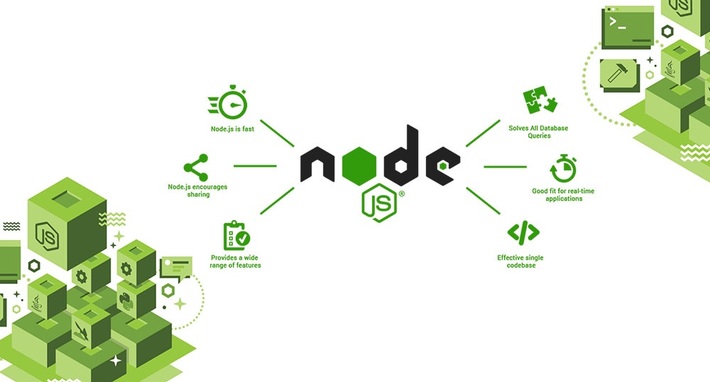Top Node js Development Trends in 2023

In recent years, Node.js has emerged as a popular choice for web application development, thanks to its scalability, efficiency, and versatility. As we enter 2023, Node.js continues to evolve and adapt to meet the changing needs of businesses and developers alike. In this article, we will explore the top Node.js development trends that are set to dominate the tech landscape in 2023, empowering businesses with cutting-edge solutions. Additionally, we will highlight the significance of Node.js development services in leveraging these trends effectively.
1. Serverless Architecture:
Serverless architecture has gained immense popularity in recent years, and it is expected to be one of the leading trends in Node.js development in 2023. Leveraging services like AWS Lambda, Google Cloud Functions, and Azure Functions, developers can build and deploy applications without managing server infrastructure. This trend allows businesses to scale their applications more efficiently, pay only for actual usage, and significantly reduce operational costs.
2. Microservices Architecture:
Microservices architecture has revolutionized the way large-scale applications are developed and maintained. Node.js is well-suited for building microservices due to its lightweight nature and event-driven, non-blocking I/O model. By breaking down complex applications into smaller, independent services, businesses can achieve enhanced scalability, fault tolerance, and maintainability. Nodejs development services play a crucial role in implementing and managing microservices-based architectures effectively.
3. Internet of Things (IoT) Development:
The proliferation of IoT devices presents a unique set of challenges and opportunities for developers. Node.js has become a popular choice for IoT development due to its event-driven and non-blocking I/O capabilities, which enable handling concurrent connections efficiently. In 2023, Node.js is expected to play a significant role in the development of IoT applications, powering real-time data processing, device management, and seamless integration with cloud services.
4. Artificial Intelligence (AI) and Machine Learning (ML):
Node.js, combined with popular machine learning libraries like TensorFlow.js and Brain.js, enables developers to build intelligent applications. In 2023, we can expect to see increased adoption of Node.js for AI and ML projects, such as natural language processing, recommendation systems, and predictive analytics. Node.js development services equipped with AI and ML expertise will be instrumental in harnessing the potential of these technologies.
5. Real-time Applications with WebSockets:
WebSockets provide full-duplex communication channels between clients and servers, enabling real-time data transfer. Node.js, with its event-driven architecture and support for WebSockets, is well-suited for building real-time applications such as chat apps, collaborative tools, and live streaming platforms. In 2023, we anticipate the continued growth of real-time applications, driving the demand for Node.js development services specializing in WebSocket integration and optimization.
6. Progressive Web Apps (PWAs):
Progressive Web Apps combine the best features of web and mobile applications, offering users an app-like experience through web browsers. Node.js, with its efficient server-side rendering capabilities, is an ideal choice for developing PWAs. In 2023, we can expect to see an increased adoption of Node.js in building PWAs that provide fast loading speeds, offline capabilities, and seamless user experiences across multiple devices.
Conclusion:
Node.js continues to evolve and shape the future of web application development. The trends outlined above – serverless architecture, microservices, IoT development, AI and ML integration, real-time applications with WebSockets, and PWAs – are set to dominate the Node.js landscape in 2023.
Leveraging these trends effectively requires the expertise of Node.js development services, which can provide businesses with tailored solutions and enable them to stay ahead in the competitive market. As we move forward, Node.js promises to empower businesses with innovative, scalable, and efficient applications that meet the ever-growing demands of the digital world.
FAQs
1. What is Node.js?
Node.js is an open-source JavaScript runtime environment that allows developers to run JavaScript code on the server-side. It uses an event-driven, non-blocking I/O model, making it highly efficient and scalable for building network applications.
2. What are the benefits of using Node.js for web development?
Node.js offers several advantages for web development, including:
- High scalability and performance due to its non-blocking I/O model.
- Sharing of code between the server-side and client-side, making development more efficient.
- Large and active community support, with a wide range of libraries and modules available.
- Easy integration with other technologies and frameworks.
- Support for real-time applications, such as chat platforms and collaborative tools.
3. How can businesses benefit from Node.js development services?
Node.js development services can benefit businesses in the following ways:
- Faster development and deployment of web applications.
- Scalable solutions that can handle high traffic and concurrent connections.
- Enhanced efficiency and performance, resulting in a better user experience.
- Customized solutions tailored to specific business requirements.
- Access to expert developers with extensive knowledge of Node.js and its ecosystem.








